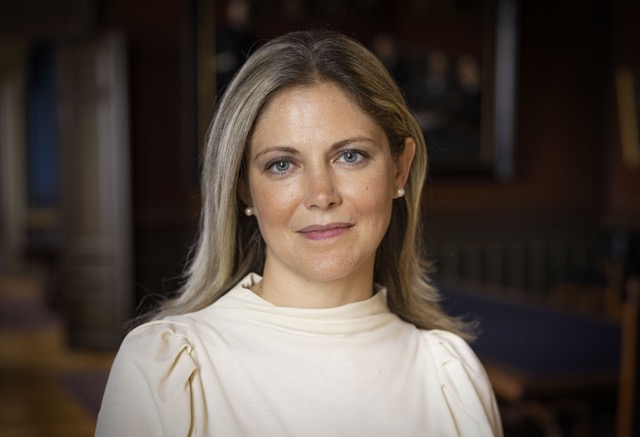Professors
Ginevra Castellano
Professor, Lab Director
Ginevra Castellano is a Professor at the Department of Information Technology, Uppsala University, where she leads the Social Robotics Lab. Her research interests are in the areas of social robotics and affective computing, and include social learning, personalized adaptive robots, multimodal behaviours and uncanny valley effect in robots and virtual agents. Over the last ten years she has been working on the development of computational abilities that allow robots to behave in a socially intelligent way in scenarios where robots provide social support to humans, for example as tutors in the classroom or as companions for children.
Katie Winkle
Assistant Professor
Katie Winkle is an Assistant Professor at the Department of Information Technology, Uppsala University, where she is developing new lines of research around trustworthy Human Robot Inteaction (and what that means) at the Social Robotics Lab. Her research interests cover the design, development, evaluation and application of socially assistive robotics, with a focus on human-in-the-loop design/development and mutual shaping approaches which recognise the two-way interaction between robots and society.
External professors
Didem Gürdür Broo
Assistant Professor
Didem Gurdur Broo is an Assistant Professor at the Department of Information Technology, Uppsala University. She is working with cyber-physical systems including industrial robotics and autonomous systems. Her research aims to provide new prototypes, tools, methods and methodologies to design future intelligent and autonomous systems more sustainable and human-centric through better data science practices and mindset shift.
Postdocs
Ana Tanevska
Ana Tanevska is a postdoctoral researcher at the Department of Information Technology, Uppsala University, within the Horizon Europe project SymAware. Their research at the Social Robotics Lab is grounded in the topic of trustworthy human-robot interaction with a particular focus on human-in-the-loop learning and shared autonomy and agency in HRI. In addition to trustworthy HRI, Ana’s research interests also include cognitive robotics (with a spotlight on the role of affect in cognition) and socially-assistive HRI.
Natalia Calvo
Natalia is a postdoctoral researcher at the Department of Information Technology, Uppsala University. With a background in mechatronics and robotics engineering, and a Ph.D. in Computer Science acquired through the MSCA ITN program Horizon 2020, her research focuses on developing fair and transparent algorithms for intelligent robots and diverse autonomous systems. She follows a multidisciplinary approach encompassing deep learning, human-robot interaction, robot manipulation tasks, and conversational interfaces. In a world where robots can actively assist humans, she aims to contribute to shaping the future of autonomous technology, fostering a society where these systems operate with fairness, accountability, and ethics at their core.
Ronald Cumbal
Ronald Cumbal is a postdoctoral researcher at the Department of Information Technology, Uppsala University, working on the SymAware project. His work involves embedding communication mechanisms to convey intention and decision-making in autonomous agents. He is passionate about robotics, dialogue systems, and human-centered Technology. His research focuses on developing adaptive robots that enhance interaction through various communication mechanisms, aiming to integrate autonomous agents into diverse social settings, with a particular emphasis on group interactions and multicultural users.
PhD Students
Lux Miranda
Lux Miranda is a PhD student in the Social Robotics Lab. She wants to use the power of ethics, AI, and robotic embodiment to remedy existential dangers and transform society into a more sustainable and compassionate place. With a background drawing from complexity science, anthropology, cognitive science, and computational modeling, their current work is focused on the ethics and diversification of robot identity construction, AI alignment, feminist robot design, the dynamics of social intelligence, and illuminating the world.
Alessio Galatolo
Alessio Galatolo is a PhD student in the Social Robotics Lab. He received his MSc degree in Machine Learning at KTH, Stockholm in 2022. His research interests mainly concern Large Language Models in topics such as Knowledge Manipulation, Personality Expression, Multi-Modal Generation in Social Robots and all the ethical implication involved. He is also part of PREVENT, an Uppsala-based project for cardio-metabolic diseases prevention in disadvantaged populations.
Hong Wang
Hong Wang is a PhD student in the Social Robotics Lab. With a background in automatic control and embedded systems, she is passionate in the fields of robotics, autonomous systems, and AI-powered human-robot interaction. Her research interests include the application of social robots within domestic environments, with the current projects focusing on the evaluation and solution of potential risks associated with healthcare robots, aiming to enhance user experience and cybersecurity through trustworthy interactions.
Yue Lou
Yue Lou is a PhD student in the Social Robotics Lab. She received her MSc in Interaction Design and Technologies from Chalmers in 2024. Her research interests lie at the intersection of design, technology, and cognitive science, aiming to develop ethical, human-centered systems to address societal challenges through human-robot interaction. Her current work, as part of the large collaborative project MICRO, explores the use of social robots as new tools to measure children’s wellbeing and mental health.
External PhD Students
Vanessa Noack
Vanessa Noack (she/they) is a PhD candidate at the Centre for Gender Research at Uppsala University. Vanessa received an MSSc and MA degree with a major in Gender Studies in 2020 and 2021. In their project Gender, Embodiment and Technology, she pays particular attention to how gender is mobilised in a technologised context by drawing on three case studies. The case studies include an analysis of gender in relation to different robots, such as the wearable robots called exoskeletons. Vanessa is also the Equal Opportunities Officer at the Centre for Gender Research at Uppsala University and takes part in the research group Technologization of the Everyday.
Laetitia Tanqueray
Laetitia Tanqueray is a PhD Candidate at the Department of Technology and Society at Lund University, co-supervised by Katie Winkle in the Uppsala Social Robotics Lab. Laetitia holds law degrees (LLB and Master 1) and a Master’s (MSc) in Sociology of Law. She investigates human-robot interactions (HRI) from a socio-legal lens. Her published work has mostly focused on informing HRI design, including in collaboration with HRI experts and in the domain of healthcare.
Alumni
Mengyu Zhong, Ph.D.
Marc Fraile, Ph.D.
Anastasia Akkuzu, Master’s student
Sebastian Wallkötter, Ph.D.
Maike Paetzel, Ph.D.
Yuan Gao, Ph.D.
Giulia Perugia, Postdoc
Mohammad Obaid, Researcher
Piercosma Bisconti Lucidi, Visiting Ph.D.
Elena Lechuga Redondo, Visiting Ph.D.











